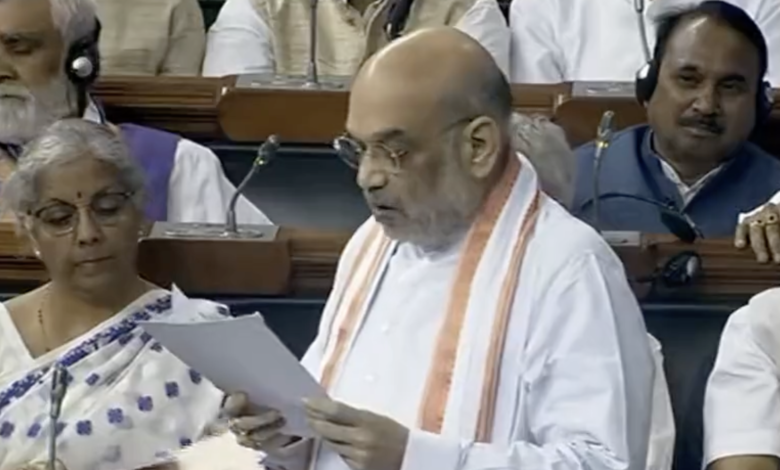Overhauling India’s Legal Landscape: New Bills to Replace IPC, CrPC, and Evidence Act
Historic Legislative Reforms: Union Home Minister Amit Shah Presents Landmark Bills in Lok Sabha

New Delhi, August 11, 2023 – Union Home Minister Amit Shah has introduced three transformative bills in the Lok Sabha, marking a significant milestone in India’s legislative landscape. The Bhartiya Nyaya Sanhita Bill 2023, Bharatiya Nagarik Suraksha Sanhita Bill 2023, and Bharatiya Sakshya Bill 2023 have been unveiled to replace age-old laws rooted in British colonial rule.
Prime Minister Narendra Modi’s call to eliminate the vestiges of slavery resonates through these groundbreaking legislations, fulfilling a key promise from his five-point pledge shared with the nation on August 15. The trio of bills aims to transcend the punitive approach of the past and usher in a justice-focused legal framework aligned with the ideals of modern India.
The bills dismantle the British-era Indian Penal Code (1860), Criminal Procedure Code (1898), and Indian Evidence Act (1872), reflecting India’s emergence as a sovereign nation with a vibrant legal identity. The Bharatiya Nyaya Sanhita Bill 2023 will replace the Indian Penal Code, the Bharatiya Nagarik Suraksha Sanhita Bill 2023 will replace the Criminal Procedure Code, and the Bharatiya Sakshya Bill 2023 will supplant the Indian Evidence Act.
“Today, we break the shackles of colonial legal constructs by embracing indigenous ideals,” stated Home Minister Amit Shah, highlighting the essence of this legislative overhaul. These new laws encapsulate the spirit of India’s Constitution, upholding citizens’ rights and aspirations.
The legislative journey of these bills has been marked by extensive deliberation and consultation, emphasizing inclusivity and relevance. Recommendations and inputs have been collected from 18 states, 6 union territories, the Supreme Court, 16 High Courts, 5 Judicial Academies, 22 Law Universities, 142 Members of Parliament, around 270 Members of Legislative Assemblies, and the public at large. This exhaustive dialogue process underscores the participatory nature of the legislative reform.
Key highlights of the transformative bills include:
- Digital Revolution in Criminal Justice: The bills integrate state-of-the-art technologies, expanding the definition of documents to encompass electronic and digital records, emails, server logs, smartphones, and other technological devices. The digitization process will span from FIR registration to case diary maintenance, charge sheet filing, and judgment.
- Enhanced Accountability and Transparency: Video recording during search and seizure has been mandated, contributing to case evidence while safeguarding innocent citizens from undue implication. The police will be held accountable through mandatory digitized updates on the status of complaints within defined timelines.
- Expanding Forensic Capacity: The creation of the National Forensic Science University aims to elevate India’s forensic capabilities, promoting the use of scientific evidence and enhancing the conviction rate. Forensic teams’ presence at crime scenes will bolster evidence collection, strengthening legal proceedings.
- Zero FIR and e-FIR: A significant step towards citizen convenience, the introduction of Zero FIR empowers individuals to file complaints beyond their local police station. The concept of e-FIR is introduced, ensuring timely and official communication of arrests to the arrested person’s family.
- Empowering Victims: The bills prioritize the rights and protection of victims, especially in cases of sexual violence. Compulsory video recording of statements in sexual harassment cases ensures accurate evidence preservation.
- Swift Justice: Timelines for case proceedings have been streamlined, minimizing delays and ensuring prompt verdicts. A renewed emphasis on summary trials aims to expedite the judicial process.
- Empowering Women and Children: These bills demonstrate a dedicated focus on safeguarding women and children’s rights. Provisions have been introduced to address crimes against women and children effectively.
- Dismantling Colonial Legacies: The replacement of archaic colonial-era laws with comprehensive indigenous legislations symbolizes India’s evolution and commitment to justice.
Union Home Minister Amit Shah stated, “Today, we embark on a new era of justice delivery, transforming our criminal justice system. These laws embody the aspirations of modern India while preserving our core values.” With these historic bills, India takes a definitive stride towards a more just, equitable, and efficient legal framework.




